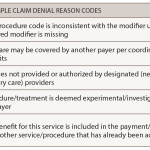Duplicate claims can be problematic for a practice, and the revenue cycle as well. If a duplicate claim is submitted due to nonpayment the first time, the duplicate claim will be denied and may slow the reimbursement process. To prevent this, it is sometimes best to check with the payer to see what steps you should take before resubmitting a claim.
Understanding these common reasons for denied claims is the first step in the success of a practice’s revenue cycle management. Preventing and managing claim denials are not easy tasks for any rheumatology practice, but putting key preventative measures in place can be the first step in the process. It is important to take the necessary steps to identify, resolve and manage denials to keep your practice on track. It is essential that all financial issues be managed properly from the moment the patient initiates an appointment to the final processing of payment.
Communication and training are at the heart of revenue cycle management. Understanding the main drivers of the revenue cycle, which include internal and external factors, is a key step in effective revenue cycle management. The ACR practice management department is devoted to helping members improve billing, collections and practice management strategies.
For more information on training and education in denials and revenue cycle management, contact the ACR practice management department at [email protected].



